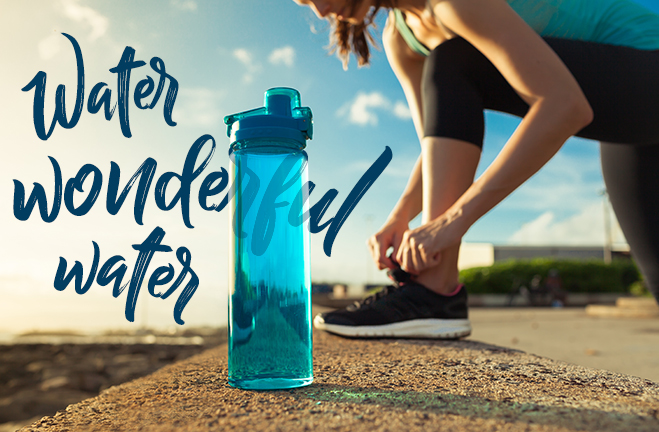In the midst of various tonics, elixirs and juices bombarding the supermarket shelves advertising their unique health benefits, we tend to forget to prioritise the most essential, nutritious drink of all… the humble water.
Water has a long list of health benefits some of which include:
- Improving athletic performance
- Reducing the amount and intensity of headaches
- Enhancing our concentration and energy levels
- Improving digestion and relieving constipation
- Reducing the risk of kidney stones
- Assisting with weight loss… and much more(1)!
It is the most underrated, cheapest and most accessible drink on the market!
How much fluid do we need?
Have you been told that you need to drink 8 cups or 2L of fluid per day? Surprise! This is actually a very generalised recommendation.
Fluid intake – like everything else in nutrition – should be individualised. What we really want to be aiming for is 35-45mL of fluid intake per kg body weight per day. For example, if you weigh 70kg, you should be aiming to drink 2.5-3.2L of fluid every day. Remember, if you are sweating more, you need to replace that fluid loss, so your fluid requirements would increase!
The best way to ensure you are adequately hydrated is to check the colour of your urine. If it is quite clear, you are hydrated. The darker yellow it becomes, the more dehydrated you are. Even being slightly dehydrated has negative effects on brain function, physical performance and overall bodily functions, e.g. lowering blood pressure below the normal range.
It was originally thought that a body water deficit of 2% produced negative cognitive performance. We now know that even less of a deficit, of 1-2%, is enough to impair cognitive performance (1)! Feeling foggy at work? Increasing your water intake may be a great (as well as cheap and simple) place to start!
DID YOU KNOW?
By the time you feel thirsty, your body has already lost 1% of its total fluid. The takeaway from this? Don’t wait until you feel thirsty to drink water. Rather, get into the habit of sipping all day, every day and prevent dehydration rather than having to cure it later!
What constitutes ‘fluid’… is it just water?
In fact, all beverages count toward your fluid intake for the day, including tea and coffee. Rumour has it that caffeine dehydrates the body, but this is not true. Rather, caffeine has a mild diuretic effect which can cause one to pass more fluid however the fluid that you attain from the beverage itself typically counteracts this fluid loss.
However just because all beverages count toward your fluid intake, doesn’t mean all beverages are ‘healthy’ and should be consumed every day. Many drinks that you’ll find in the fridge of the supermarket or convenience store are still considered “sometimes beverages”. Water is always king, with other healthy drinks including tea, coffee, naturally flavoured water and fermented beverages such as kombucha or kefir!
Drink Case Study: Carbonated Water
There are many negative claims about carbonated water. Let’s dispel a few of these myths, shall we?
- “Soda water is high in salt/sodium”
Contrary to many claims, carbonated water is not high in sodium. Yes, it does have some sodium in it but with most products <10mg/100g, it is well and truly classified as a ‘low-salt’ option. (NOTE: “low salt” is classified as a product with <120mg/100g sodium).
- “Drinking soda water causes minerals to leech from the body and can negatively affect bone health”
It isn’t the acid or the sodium in the carbonated beverages that is the culprit impacting on bone health. In fact, one study (2) showed positive effects on calcium retention after 8 weeks of drinking soda water (with sodium) in comparison to plain mineral water. This claim stems from studies that associate carbonated cola beverages (such as Coke) with poor bone health. In such studies, the people drinking cola beverages had both a high phosphorus intake (from the Coke) and an inadequate calcium intake, this disadvantageous ratio being what was contributing to an increased risk of bone loss. Furthermore, those who drank more cola beverages tended to drink less milk, and therefore had less calcium coming into the body. This in turn, lead to poorer bone health outcomes.
- “Carbonated water is acidic and therefore increases our internal pH and causes dental erosion”
Yes, carbonated water is slightly acidic (pH of 3-4) but our lungs and kidneys are constantly working to neutralise the pH of our blood, keeping it in check at a slightly alkaline pH of 7.35–7.45, regardless of what you eat or drink. (Think about how acidic lemon or oranges are – we still eat them just fine, don’t we?) In terms of our teeth, dentists agree that although carbonated water can cause some erosion over a long period of time, it is unlikely the major cause of cavities and other dental issues we see today, which can majorly be contributed to soft drinks and other sugar-sweetened beverages. If or when choosing carbonated water, optimize your dental health with the following tips:
- Drink it with a meal as increased saliva production from chewing your food assists in neutralising the effects of acid on tooth enamel
- Avoid adding the classic wedge of lemon and lime or any syrups, as this increases the erosive capacity of the drink
- Drink some plain water afterwards to assist in rinsing the teeth
- Try using a straw to reduce the contact between your tooth enamel and the carbonated water to start with!
So, if you’re wanting something a bit more funky than plain old water, choosing soda water on a hot day, or in place of a high sugar or alcoholic beverage, is a perfectly healthy choice!
Top Tips on Increasing Water Intake
- Keep a large bottle of water on you at all times and set a time limit for when it needs to be finished. For example, aim to finish drinking 1x 750mL water bottle before morning tea (10am); again before lunch (1-2pm); again before the work day is finished (5pm); and again before the end of the evening. This simple schedule alone will get you drinking 3L of water every day!
- If you’re sick of plain tap water, try jazzing up your water. Pop some ice into your bottle to make it more refreshing or get more creative by adding more flavoursome ingredients such as citrus (lemon, lime or orange slices), fresh or frozen berries, cucumber slices or even fresh mint leaves!
- Keep a water journal to track your overall intake for 1 week. You may wish to also include the colour of your urine throughout the day to assist you in identify times in the day where you tend to drink less or are more dehydrated. Simply through increasing your own awareness regarding how much fluid you are consuming and if your body is adequately hydrated, will assist you in ensuring you’re drinking enough for YOUR body!
References
Article written by our in-house dietitian, Jordan Kain (BExSpSc, MND, APD)


